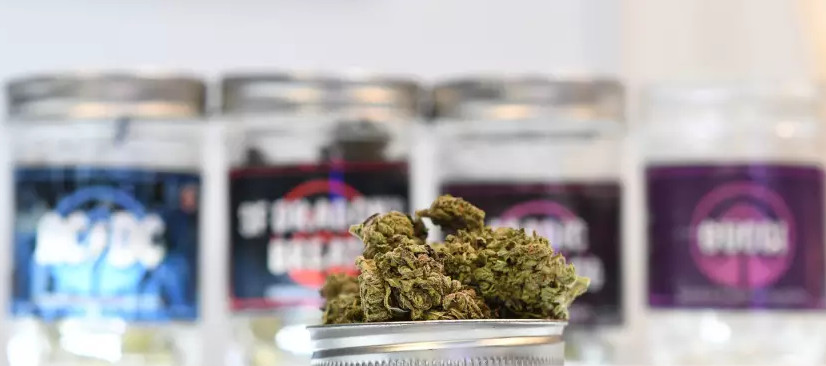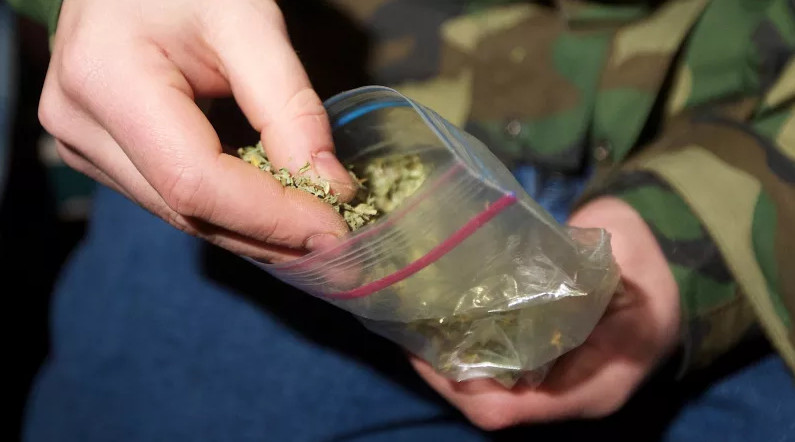CBD has drawn a lot of attention in recent years from neurologists and other researchers intrigued by hints that the chemical might prove helpful to people; there’s been preliminary study of possible benefits in reducing chronic pain, anxiety and seizures in humans, for example.
So it’s probably no surprise that some folks are interested in CBD’s therapeutic potential for Fido or Fluffy, too.
Betsy initially got a prescription for medical marijuana to help with her own joint pain. While at the medical marijuana dispensary, she also picked up a vial of CBD oil designed for pets, on the advice of the manager.
The supplement has already yielded good results in their other dog, Angus — a sweet blue merle Aussie who was abused as a puppy by previous owners, and still sometimes “becomes Frankendog” around canine strangers, Betsy says. Occasional doses of the cannabis extract in high-stress situations, she says, help to mellow him out.
The Firebaughs aren’t the only ones exploring marijuana-based therapies for man’s best friend. A growing number of firms are marketing CBD for noise anxiety and other ailments in companion animals. Denver-based Therabis specifically advertises one of its hemp-derived CBD supplements as an aid to help dogs get through the Fourth of July.
And the Los Angeles-based makers of VetCBD oil say that early July, along with New Year’s Eve, is one of their busiest sales periods. Animal shelters tend to see an increased influx of runaway pets around the two holidays — because of fireworks, notes VetCBD’s founder Tim Shu, who is also a veterinarian.
Still, cannabis therapies for pets fall into a legal gray zone. While numerous states, including California, have legalized medical marijuana and/or recreational pot for people, cannabis remains federally illegal, and the U.S. Drug Enforcement Administration recently clarified that it considers CBD extracts unlawful too. None of the cannabis-derived products for pets are approved by the Food and Drug Administration, and state licensing agencies, such as the California Veterinary Medical Board, don’t allow veterinarians to prescribe them.
Shu says marijuana has long had a bad reputation in the veterinary community, which has seen many ER cases of dogs suffering toxic effects from gobbling down their owners’ marijuana stash or edibles. Large doses of THC, the chemical that produces pot’s intoxicating effects, can cause wobbliness, disorientation, vomiting and loss of bladder control in canines.
But the premise of companies selling cannabis-derived products for pets is that non-psychoactive CBD, in combination with a small amount of THC, can be beneficial. For instance, Shu’s VetCBD oil contains a 20:1 ratio of CBD to THC, a formulation he says he developed in a quest to aid his own elderly dog, Tye, a mixed pit bull breed. Tye has arthritic pain and fireworks anxiety, the veterinarian says, but can’t handle the side effects of standard veterinary medications.
By experimenting with Tye and other patients in his practice, Shu came up with his cannabidiol concoction — which is extracted from organic cannabis flowers — and a variety of specific dosages for pets of different sizes.
Tye’s mobility has since improved, Shu says, and “I can actually walk her outside during Fourth of July fireworks. For a lot of owners, it’s a night-and-day difference.”
Such anecdotes may sound compelling, but some other vets say they’d like to see scientific evidence. Brennen McKenzie, a veterinarian in Los Altos, Calif., writes the SkeptVet blog and is on the board of the Evidence-Based Veterinary Medicine Association. In regards to CBD, McKenzie says, “we have virtually no research in pets, so we are guessing and extrapolating.”
It’s human nature, he says, for us all to “see what we want and expect to see, rather than what is really there, much of the time.” He recalls, for example, a clinical trial in which some arthritic dogs got a pain reliever and others a placebo. More than half the owners of the dogs who got the placebo reported dramatic improvement in their pets’ symptoms.
McKenzie acknowledges that the limited laboratory research that’s been done in dogs so far hasn’t turned up any severe side effects from the short-term use of CBD. However, he points out, each animal species is different; cats, for example, are extremely sensitive to any chemicals.
Carefully designed clinical trials still need to be done, McKenzie says, to fully assess CBD’s benefits and risks in treating specific health conditions in pets.
Yet, the legal morass surrounding marijuana makes it difficult to conduct any scientific studies of cannabis-based treatments in the U.S. in people or any other animals.
So, McKenzie concedes it may sometimes be appropriate for people to try cannabis-derived products in their pets in certain situations, such as when they’ve exhausted other treatment options that are supported by better scientific evidence.
“You just have to be aware of the risk that you’re taking,” he says, “and the uncertainty involved.”
Noise anxiety may be one of those situations, McKenzie says, noting that veterinary medicine doesn’t have a great solution that’s widely and reliably effective in allaying noise phobia.
Standard treatments, such as sedatives and antidepressants, can come with their own side effects. Other options include behavioral therapies — playing white noise or music, for instance, or teaching owners to be low-key and calm in response to a panicky pet. But that may not work for pets with severe anxiety.
Even if CBD is effective for noise anxiety, McKenzie says, he has one more caveat: The marketplace of cannabis-based veterinary products is unregulated, with no oversight of quality control. “You may not be getting what you think you’re getting,” he says.
So where does all of this leave Betsy and Andy Firebaugh? They’re reluctant to put Seamus on a prescription sedative or antidepressant, and they’ve tried other tactics, including positive-reinforcement behavioral training and a swaddling jacket.
Bob Pallares, who runs the nonprofit medical marijuana dispensary in Santa Cruz where the Firebaughs bought their VetCBD supplement, says he carries this particular product because it’s organic and of high quality, as tested by a third-party lab.
Persuaded that VetCBD oil has helped Angus with no ill effect, the Firebaughs hope the supplement might do the trick for Seamus tonight, too. When the firecracker fracas starts this evening, they’ll shut the windows, turn up the radio — set to classical music — and cross their fingers. And if that’s not enough to soothe Seamus, they’ll mix a little CBD oil into his food.
“We’ll just see how he does,” Betsy says.
credit:npr.org













